Turkey Wants to Be a European Power Now
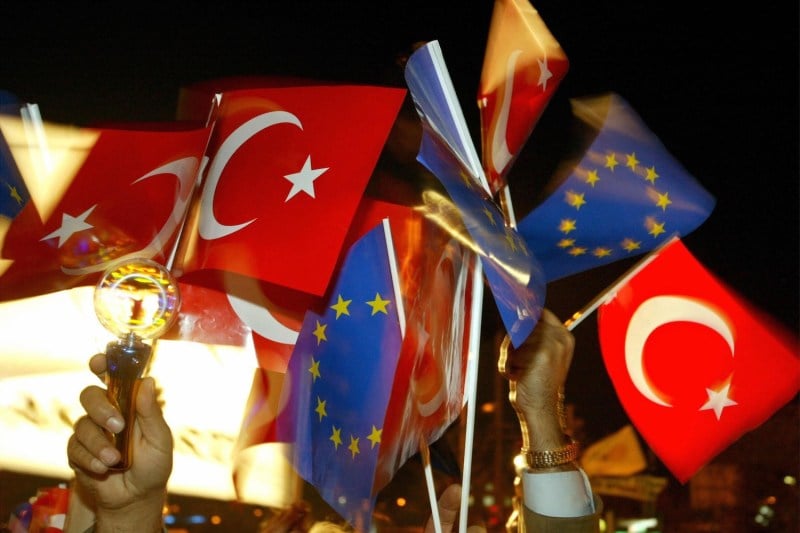
Turkey Wants to Be a European Power Now
Ankara is preparing to send peacekeeping troops to Ukraine—and to deepen ties with the EU.
Turks wave national and EU flags as Turkish Prime Minister Recep Tayyip Erdogan arrives at Ataturk International Airport in Istanbul on Dec. 18, 2004. MUSTAFA OZER/AFP via Getty Images
The message Europeans hear among Turkish officials these days is surprise that anyone would be shocked at U.S. President Donald Trump’s revisionist foreign policy. For Turkey, the United States has never been a reliable friend. But there is also little trace of schadenfreude. The prospect of Trump’s America gifting Ukraine to Russian President Vladimir Putin and wrecking NATO is as troubling for Turkey as it is for the European Union and the United Kingdom.
But Turkish policymakers also see the ongoing crisis as an opportunity to reset ties with Europe. Turkey has been openly flexing its muscles in the Middle East, where the fall of the Assad regime in Syria has enhanced its influence. But it is also quietly becoming more aware of itself as a key stakeholder in European security, too.
The message Europeans hear among Turkish officials these days is surprise that anyone would be shocked at U.S. President Donald Trump’s revisionist foreign policy. For Turkey, the United States has never been a reliable friend. But there is also little trace of schadenfreude. The prospect of Trump’s America gifting Ukraine to Russian President Vladimir Putin and wrecking NATO is as troubling for Turkey as it is for the European Union and the United Kingdom.
But Turkish policymakers also see the ongoing crisis as an opportunity to reset ties with Europe. Turkey has been openly flexing its muscles in the Middle East, where the fall of the Assad regime in Syria has enhanced its influence. But it is also quietly becoming more aware of itself as a key stakeholder in European security, too.
There are early signs of a deepening security conversation between Turkish President Recep Tayyip Erdogan’s team and its European counterparts. Foreign Minister Hakan Fidan attended the emergency summit on Ukraine convened by British Prime Minister Keir Starmer on March 2, two days after Ukrainian President Volodymyr Zelensky clashed with Trump and U.S. Vice President J.D. Vance at the White House. Turkey has become part of the “coalition of the willing” headed by Starmer and French President Emmanuel Macron.
After a summit on March 6 hosted by the EU, Erdogan signaled that Turkish troops could eventually be deployed in Ukraine. Last week, military chiefs from more than 30 countries held talks in Paris to discuss Ukraine’s security and the possibility of an international peacekeeping force—an idea championed by France and the U.K. Erdogan is nurturing ties with other key countries, too. Polish Prime Minister Donald Tusk was in Ankara on March 12 to discuss Ukraine and European security.
To be sure, it is still early, and the shape and mission of a European-led force remains shrouded in uncertainty. Much hinges on Trump’s ongoing effort to convince Putin to agree to a cease-fire. However, if some sort of deal is cut, Turkey could play a major part in making it stick. Having extended steadfast support to Ukraine since the start of Russia’s full-scale invasion in 2022, but also having kept ties to Russia and even having led mediation efforts, Turkey’s military presence would likely be acceptable to both parties. While Moscow has lashed out at the idea of European peacekeepers, it has been silent on Turkey.
Can Turkey perform the job of peacekeeper? There’s reason to think so. The past decade has seen Ankara send troops to various other countries, such as Syria, Libya, and Azerbaijan. In the first two cases, it has even come to blows with Russia—either the regular military or proxy forces like the Wagner Group. In Syria, Turkish forces ended up running joint patrols with the Russian military, too, in order to police a fragile peace around Idlib. In other words, Turkey has accumulated significant experience in managing conflicts with Russia. Erdogan and Putin, along with their top brass, have exchanged punches but have also sat at the negotiation table to craft solutions.
Turkey now hopes that security cooperation with Europe in Ukraine could spill into the EU-Turkey relationship. This could involve a wider security partnership based on containing Russia and underwriting stability in Europe. But Turks are also keen to negotiate an update of their 1995 Customs Union. Like Europe’s other trading partners, Turkey has been adapting to the European Commission’s Green Deal and adopting legislation in line with EU environmental standards to ensure unfettered access to the single market. But it would ultimately like an expansion of the trading benefits it currently enjoys.
The current Customs Union arrangement covers industrial goods and has been beneficial for the growth of trade and investment ties between the EU and Turkey. It continues to drive export-led growth at a time when the Turkish economy is experiencing difficulties. However, for Turkey to develop further and make the transition to a knowledge-based model, avoiding the proverbial middle-income trap, the service sector should also be included.
Defense industries are part of the puzzle, too. While Europe is gearing to ramp up military spending, Turkish companies such as Aselsan or Baykar, which manufactures the Bayraktar drone, would like to profit. Baykar and Leonardo, a leading Italian firm, recently set up a joint venture focused on artificial intelligence and unmanned platforms. The Turkish defense sector will be keen to tap into defense funds raised jointly by the EU on bond markets, a proposal that is still a matter of fervent debate in Brussels. Whether the money should be directed only to EU manufacturers, a stance favored by Paris, or open to third countries is of critical importance to Turkey, too.
Finally, Turkish officials would also like to move forward on visa liberalization, a sore spot in the overall EU-Turkey relationship. The 2016 refugee deal—under whose terms Turkey receives billion of euros in exchange to hosting close to 4 million Syrians—was originally linked to a promise to make it easier for Turkish nationals to obtain Schengen visas. Yet little progress has been made since then. Right now, millions of Turks who held special civil servant passports travel visa-free. But all others need to wait on long lines and provide volumes of paperwork to travel to the EU. At the same time, all other EU candidate countries—such as Georgia, Bosnia and Herzegovina, and Kosovo—can enter the EU without restriction.
Ankara would much prefer that reengagement with Europe be a package deal, not a one-off simply involving Ukraine. To make progress, Erdogan should do away with an old shibboleth: that membership in the EU is an objective. The accession talks have stalled for over 15 years now. Turkey’s authoritarian drift—with the arrest this week of Istanbul Mayor Ekrem Imamoglu offers the latest evidence—and the fears of migration in Europe have long killed the process. Privately, Turkish politicians accept this reality and are ready to move on as their past acrimony wears off.
Instead, some form of the privileged partnership that Europe’s Christian Democrats envisaged for Turkey years ago as an alternative to accession is now in the works. Access to a deepened European Customs Union could be one pillar. Security collaboration, in Ukraine but also on issues such as defense procurement or rebuilding Syria, could be another.
Turning from a candidate to a partner won’t necessarily amount to a loss of face either. With the U.K., another strategically important country that’s also outside the EU, Turkey need not feel like a second-rate member of the club. Whatever the weather, Ankara is a top player in NATO as well as the European Political Community that is due to hold its annual summit in Albania on May 16.
Moving beyond the enlargement paradigm is not cost-free. The EU won’t be empowered to hold Turkey accountable for failure to uphold the rule of law and democratic norms. That includes complying with the European Court of Human Rights’ ruling on the landmark case of philanthropist Osman Kavala.
Yet, realistically, the EU has long lost its leverage over domestic politics in Turkey. A return to full-fledged democracy depends on citizens and elites, not conditionality. But amid the doom and gloom, there are some glimmers of hope: Erdogan’s loss in Turkey’s 2024 local elections and, more recently, the prospective end to the conflict in the country’s Kurdish-populated southeastern provinces.
Confronted by Putin and Trump, Europe is being reconfigured. This is a chance for Turkey to become a full member of Europe’s club under a new set of rules. It should not let the opportunity go to waste.
Dimitar Bechev is the director of the Dahrendorf Programme at the European Studies Centre, St Antony’s College. He is the author of Rival Power: Russia in Southeast Europe (Yale University Press, 2017).
More from Foreign Policy
-

Periodic table The Periodic Table of States
The org chart for a post-Westphalian world.
-

French Emperor Napoleon Bonaparte leads the final assault by the Imperial Guard before his defeat at the Battle of Waterloo in what is today Belgium, on June 18, 1815. The Cost of Ignoring Geopolitics
Like Napoleon and the Ming dynasty, Europe is paying the price for strategic blindness.
-

Donald Trump holds solar eclipse glasses. What I Got Wrong About Trump’s Second Term
I didn’t entirely see this coming. Here’s why.
-

A woman walks past an advertisement for the Russian army at a bus stop. Russia Is Only Winning Inside Trump’s Head
As Russians will tell you, the reality on the ground looks very, very different.
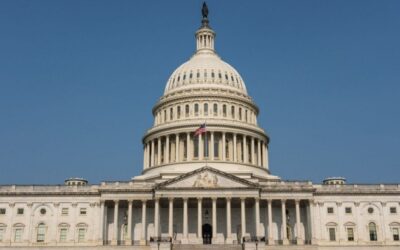


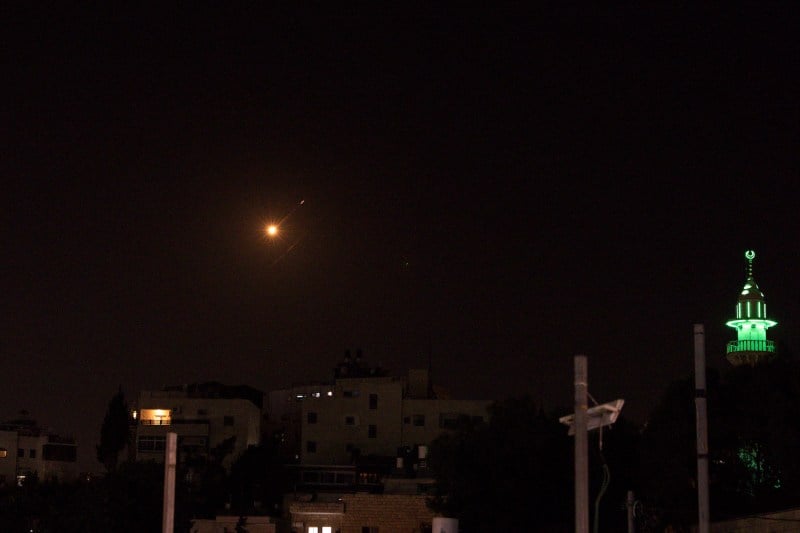
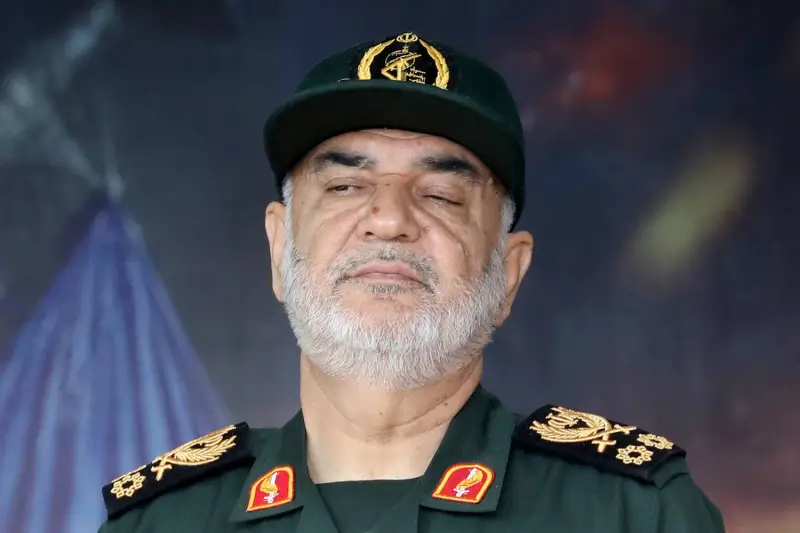
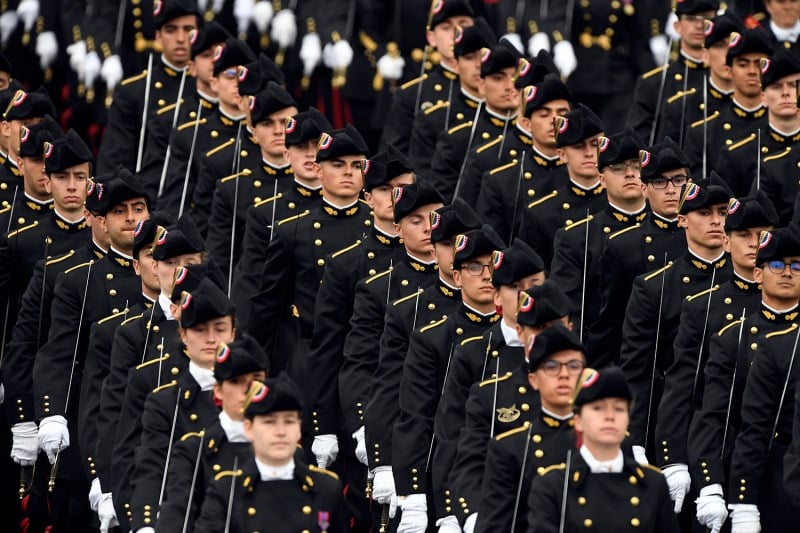

Join the Conversation
Commenting on this and other recent articles is just one benefit of a Foreign Policy subscription.
Already a subscriber?
.
Subscribe
Subscribe
View Comments
Join the Conversation
Join the conversation on this and other recent Foreign Policy articles when you subscribe now.
Subscribe
Subscribe
Not your account?
View Comments
Join the Conversation
Please follow our comment guidelines, stay on topic, and be civil, courteous, and respectful of others’ beliefs.
Change your username |
Log out
Change your username:
CANCEL
Confirm your username to get started.
The default username below has been generated using the first name and last initial on your FP subscriber account. Usernames may be updated at any time and must not contain inappropriate or offensive language.